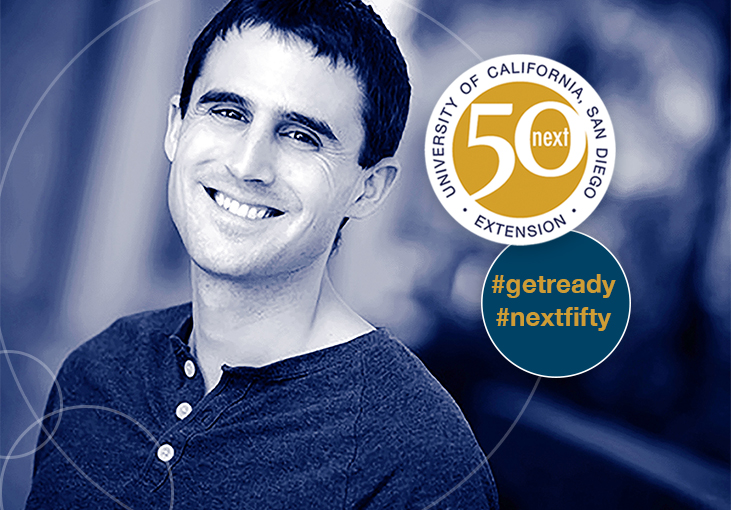11 October 2016
50 Voices of the Future: Paul Niehaus on rethinking ways to eradicate global poverty

In honor of UC San Diego Extension’s first 50 years, 50 Voices of the Future asks thought leaders about the trends, breakthroughs and social advances they foresee over the next 50 years.
Paul Niehaus possesses an essential trait for someone trying to eradicate global poverty: he’s an optimist. The UC San Diego economics professor believes there is a good chance that the number of people living in extreme poverty – those subsisting on 65 cents a day or less – will be reduced to a “negligible” figure by 2030. Perhaps a seventh of the world’s population currently falls into this category, many of them in Africa and India. As one of the co-founders of the international charity GiveDirectly, Niehaus has helped rethink the basic model of getting money into the hands of the people who need it most. The idea is to let donors make a contribution from their bank account directly to a person in dire straits – a starving farmer in Kenya, for instance. Fifty years from now, if all goes as Niehaus predicts, “the hope is that my field won’t exist.”
Why is the work you do important?
Global poverty is one of the top two problems facing humanity right now, along with climate change. We’re working on it in the most direct possible fashion, making it easier to transfer resources to the extremely poor. We’re moving toward a world in which everybody is plugged into the digital financial system so that it will be possible to pay anybody anywhere at any time. We’re not there yet but the different initiatives I’ve worked on, along with my colleagues, are contributing in different ways to helping us get there and take advantage of it.
What are the influential/exciting developments happening in your field now and why?
We see two megatrends that have the potential to reshape the fight against global poverty. One is the spread of these last-mile payment solutions, the fact that we’re getting poor people plugged into the financial network, which makes it much easier to transfer resources and give them access to financial services like credit, savings and insurance. The other is the spread of rigorous impact evaluation over the last 15 years. For the first 50 years of conducting research and development in anti-poverty campaigns, we didn’t use experimental testing. That really only got started in a big way in the early 2000s. It’s just been this incredibly exciting decade where we’ve learned enormous amounts. A lot of things that we assumed would work have turned out not to work very well, and some things we thought wouldn’t work – like literally giving money directly to poor people – have worked a lot better than expected.
What’s the next big thing?
We now have a group of things that we know work very well. The next big thing is execution. Actually getting some of these things done really well on a really big scale is the less sexy thing that tends to get neglected. Everybody’s more interested in what’s going to be in the next TED talk. I’m more interested how we can take what we already know works well and scale it up to 100 million or a billion people.
How big an impact will your field play in shaping the future of the San Diego region and beyond?
There are some great communities of people here in San Diego working on these things. There’s an Effective Altruism chapter getting started at UC San Diego. My hope is to see more of that happen and to see that community form and coalesce in San Diego. There are a lot of people in San Diego who want to give generously and would like to be more engaged in thinking about how to do that more effectively.
Hop into your time machine…what does the future look like for this field in 50 years? How can individuals/companies get prepared for what’s next?
In the very big picture, I’m incredibly optimistic. I think if you look at the trends now, there’s a reasonable chance that we will have reduced extreme poverty to a negligible number of people by 2030. To me, it’s all about getting there as quickly as possible.
Paul Niehaus is co-founder and president of GiveDirectly. He also holds an academic appointment in the Department of Economics at UC San Diego, where he works with governments in India to improve the implementation of social programming.